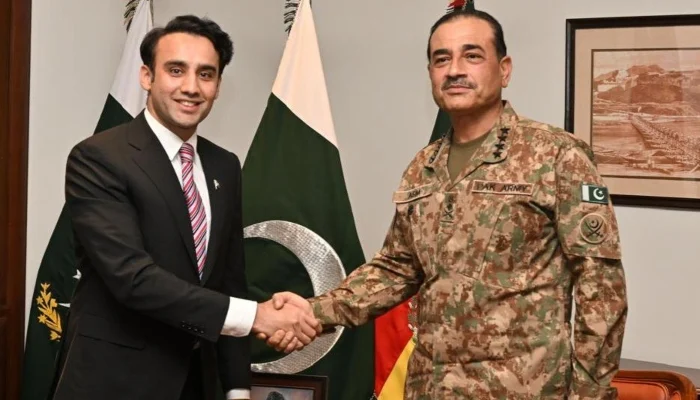RAWALPINDI – Pakistan is taking a bold leap toward digital transformation. At a key meeting inside the General Headquarters (GHQ), Army Chief Field Marshal Asim Munir sat down with Bilal Bin Saqib, the CEO of the Pakistan Crypto Council (PCC). Their discussion centered around the country’s growing digital economy and the vital role of young people in shaping its future.
The two leaders emphasized that blockchain, artificial intelligence, and cryptocurrency are not threats. Instead, they are powerful tools for economic revival. Both stressed the importance of placing Pakistan’s youth at the heart of this digital revolution.
Bilal Bin Saqib said, “The Pakistan Crypto Council exists because our youth demand to be part of the global tech movement.” He added that young Pakistanis see decentralised finance and digital technologies as opportunities to innovate and lead.
During the meeting, Saqib shared major milestones achieved by PCC. These included visits by global players like World Liberty Financial and Binance founder Changpeng Zhao. He also highlighted regulatory consultations, international partnerships, and ongoing projects designed to prepare Pakistani youth for a digital-first economy.
One of the most groundbreaking updates followed soon after the meeting. The Ministry of Finance officially announced a national strategy to regulate digital assets. As a part of this plan, the government has approved the creation of a new body: the Pakistan Digital Assets Authority (PDAA).
According to the Finance Ministry, this authority will oversee the country’s blockchain-based financial infrastructure. Finance Minister Muhammad Aurangzeb said, “Pakistan is standing at the edge of digital progress. The Pakistan Digital Assets Authority is our commitment to building a secure, modern, and inclusive digital economy.”
He further noted that the new authority would help Pakistan become a regional leader in digital finance. The PDAA will provide clarity for investors, ensure safe regulation, and promote responsible innovation. A special focus will remain on empowering startups and the younger population.
The authority is also expected to regulate Pakistan’s massive $300 billion informal crypto economy. It will pave the way for tokenising state assets and government debts. Another key part of its agenda is enabling Bitcoin mining with surplus electricity, which will help Pakistan monetise its unused energy.
The Pakistan Digital Assets Authority also aims to launch AI data centers. This step will position Pakistan as a major player in regional digital infrastructure.
The announcement comes just before Bilal Bin Saqib’s visit to Las Vegas for the Bitcoin 2025 Conference. He will join international leaders in cryptocurrency and AI on the global stage. Among other attendees are US Vice President JD Vance, Eric Trump, Donald Trump Jr., and crypto czar David Sacks. Big names like Michael Saylor and Senator Cynthia Lummis will also participate.
Speaking about the momentum, Saqib said, “With strong leadership behind us, we’re now acting fast. The youth of Pakistan aren’t just observers—they’re the ones pushing the boundaries. Our job is to give them the tools and platforms they need to rise.”
The Pakistan Crypto Council continues to be a key force in shaping crypto policy and technology innovation. Its mission is deeply rooted in youth empowerment and international cooperation.
Pakistan already has over 50 million active crypto users, with yearly trades crossing $300 billion. The country ranks among the top five globally in digital currency adoption. About 70% of the 240 million population is under 30 years old—an ideal mix for a thriving crypto market.
Pakistan is also the world’s third-largest freelance economy. Each year, over 50,000 IT graduates add to its young, tech-savvy workforce. These digital natives are ready to lead Pakistan into a new era of financial innovation.


